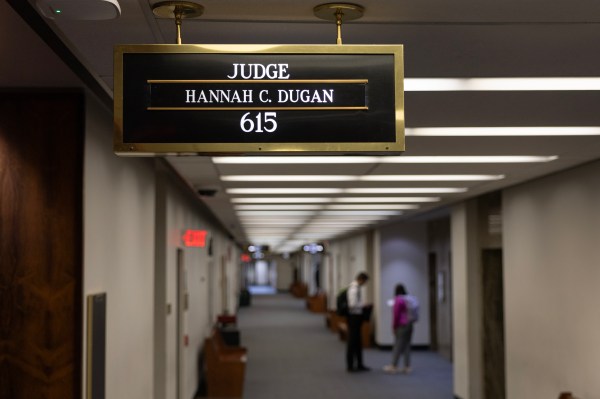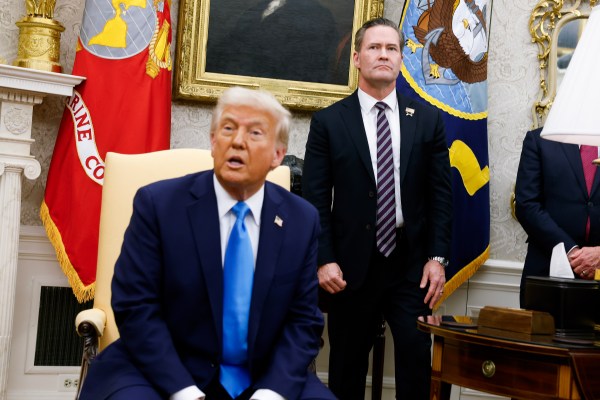Happy Saturday! You should know this newsletter was a bit of a treat for me, because when I sat down to write it, I was coming at it from the perspective of a reader, not an editor. Our kids had a fall break this week, and so we took a vacation.
For a few reasons, that was a crazy idea. The timing, for one. (We do have that election coming up.) So I have to offer many thanks to everyone at The Dispatch who kept things running smoothly while I was out. And, obviously, the pandemic is getting worse, not better. But back in March before things got real, we had booked a trip to Disney World. As April turned to May and May to June and we realized things weren’t going away anytime soon, we considered not going. Then we remembered we booked a nonrefundable room. Oops.
In National Lampoon’s Vacation, Clark W. Griswold piles his family into the station wagon and sets off for Walley World. After a series of mishaps, they arrive to find the park closed. Our case was a bit of a reversal: Wally World was open, so we loaded up the family truckster and headed south. We could have flown: It would have been faster and—based solely on what the kids spent on car snacks every time we stopped for gas—probably cheaper. But for all the reports about how flying has been safer than expected, I can never get that Washington Post graphic from back in April of droplets spreading on a plane out of my mind.
I won’t bore you with a slide show of family photos. I won’t give a review of our favorite rides, or complain about overpriced gelato. I will say that, while it was a different trip than we envisioned, Disney is doing the utmost to keep its guests safe. We had the best time that we could have. And driving through the Smoky Mountains while they were full of fall color was a nice bonus.
Being more offline gave me a fresh perspective. I got to chuckle along to Jonah’s midweek G-File while standing in line for a ride at the Magic Kingdom. I read The Morning Dispatch while sipping my morning coffee from the hotel-room balcony. And I was really grateful that David took the time to wade through all of the fallout from the New York Post-Hunter Biden kerfuffle so I didn’t have to.
We’re in the homestretch now. We have lots of great reporting and analysis planned for the next two weeks, and we’ll be ready to react to any October surprises (though we’d be plenty happy if there are no October surprises).
For now, take a spin through our best work of the week.
The introductory paragraphs to the Declaration of Independence are taught to American schoolchildren starting in elementary school and burned into our brains by the time we get through high school civics classes. But … is it law? After Amy Coney Barrett answered in the negative during her confirmation hearing—“While the Declaration of Independence tells us a lot about history and the roots of our republic,” Barrett said, “it is not binding law.”—Timothy Sandefur wanted to set the record straight. He lays out why it’s a legal document (it appears in both the United States Statutes at Large and the U.S. Code) and why it matters (it’s the basis of our constitutional law, and it’s frequently cited by judges when writing opinions).
Section 230 of the Communications Decency Act of 1996 might contain the “26 words that created the internet,” but its meaning has been twisted by critics who try to draw false distinctions between “platforms” and “publishers” and who try to argue that Section 230 demands internet companies maintain political neutrality. And it has drawn the ire of both liberals and conservatives. Luckily, Scott Lincome is here to bust some myths in the latest edition of Capitolism (🔓): “Pro tip: when both sides are mad about ‘systemic bias,’ chances are good that both are wrong.” He also has some warnings about what could go wrong were the law to be curtailed or repeated. “Long delays in, or strict internal regulation of, website commentary would also discourage use (who wants to wait a day to post a Tweet?), thus further chilling online speech,” he writes.

Did the news this week have you in flashbacks? We’re talking about a laptop with allegedly incriminating emails, Trump is getting rally goers to chant “Lock him up,” and people are starting to wonder if the polls are wrong. In the G-File, Jonah points out that in some ways, it feels like 2016 never ended. Part of it is because Trump never got out of campaign mode. “There’s an old idea in politics, summarized by Mario Cuomo’s dictum that you ‘campaign in poetry but govern in prose.’ … It’s hard to find any poetry in Trump’s campaign style, but I suppose you could call it a form of slam poetry—a kind of constant staccato of anti-melodic shouts and irritable mental gestures transformed into slogans. The relevant point is that he never really transitioned to the prose.” He concludes though, that it’s hard for Trump to run like he’s not a politician anymore, and that “it’s just a feeling” that we’re still living in 2016. “Of course, Trump can still win. But if he wins it won’t be for the reasons he won in 2016. Because it’s not 2016 anymore and never will be again.”
It might not be surprising that Joe Biden is winning the youth vote—younger voters are typically more liberal—but what is interesting is that he’s doing so despite not generating a significant amount of enthusiasm. As Audrey explains, he’s benefiting from negative partisanship: A recent Morning Consult poll shows that 52 percent of young Biden supporters are voting for the former vice president, but 45 percent are voting against Donald Trump. She points to the “Settle for Biden” campaign, which has 260,000 followers on Instagram, as one example of the trend: Even if young voters are not particularly jazzed about the Democratic nominee, it looks like anti-Trump animus might be enough to cancel out the enthusiasm gap for Biden.
In his Tuesday French Press (🔓), David tries to sort out the whole sordid mess of the New York Post’s Hunter Biden story. He starts by pointing out the “highly irregular and improper” handling of the story by the Post, and then he goes on to highlight the problems with the response to the story by Facebook, which limited its circulation, and Twitter, which prevented it from being shared at all and even temporarily locked the Post’s account. Yes, both companies were within their rights to make those moves, but “Ham-handed attempts at online censorship can, perversely enough, enable the spread of misinformation as anger over the perceived injustice of the moderation rockets not just across the platform itself, but also across the media outlets Silicon Valley doesn’t control.”
And here’s the best of the rest:
-
COVID cases are on the rise and a new round of economic relief seems to be … not imminent. Meanwhile, Americans are struggling financially. Abby McCloskey warns that the recovery will not only be long and painful, but that middle and low-income workers are going to fare worse.
-
Ayaan Hirsi Ali uses the example of Ibram X. Kendi’s tweet thread on “White colonizers” adopting black children to use them as props to caution against progressives who seek to divide all of us into distinct groups.
-
How do we solve a problem like North Korea? In Vital Interests (🔓), Thomas Joscelyn analyzes Trump’s “maximum pressure” policy toward North Korea through the lens of H.R. McMaster’s new book, Battlegrounds: The Fight to Defend the Free World.
-
In The Sweep, Sarah has interviewed pollsters, election lawyers, debate moderators—all kinds of different people who work on campaigns. This week she talked to … someone who’s been a candidate, Nevada Lt. Gov. Brian Krolicki.
-
If you missed the debate like I mostly did, you can still catch up by watching the video of the special Dispatch Live conversation that Sarah, David, Jonah, and Steve had Thursday night after it was all over.
-
On the pods: Sarah and Steve talked to National Journal’s Josh Kraushaar about whether the GOP can hold on to the Senate and more on The Dispatch Podcast. On Advisory Opinions, David and Sarah tackle the belief held by voters on both sides of the aisle that the polls are wrong and Trump could win in a landslide. And Tim Alberta chats with Jonah on The Remnant about what voters in swing states really care about.
Photo from Michael Ochs Archives / Handout.







Please note that we at The Dispatch hold ourselves, our work, and our commenters to a higher standard than other places on the internet. We welcome comments that foster genuine debate or discussion—including comments critical of us or our work—but responses that include ad hominem attacks on fellow Dispatch members or are intended to stoke fear and anger may be moderated.
With your membership, you only have the ability to comment on The Morning Dispatch articles. Consider upgrading to join the conversation everywhere.